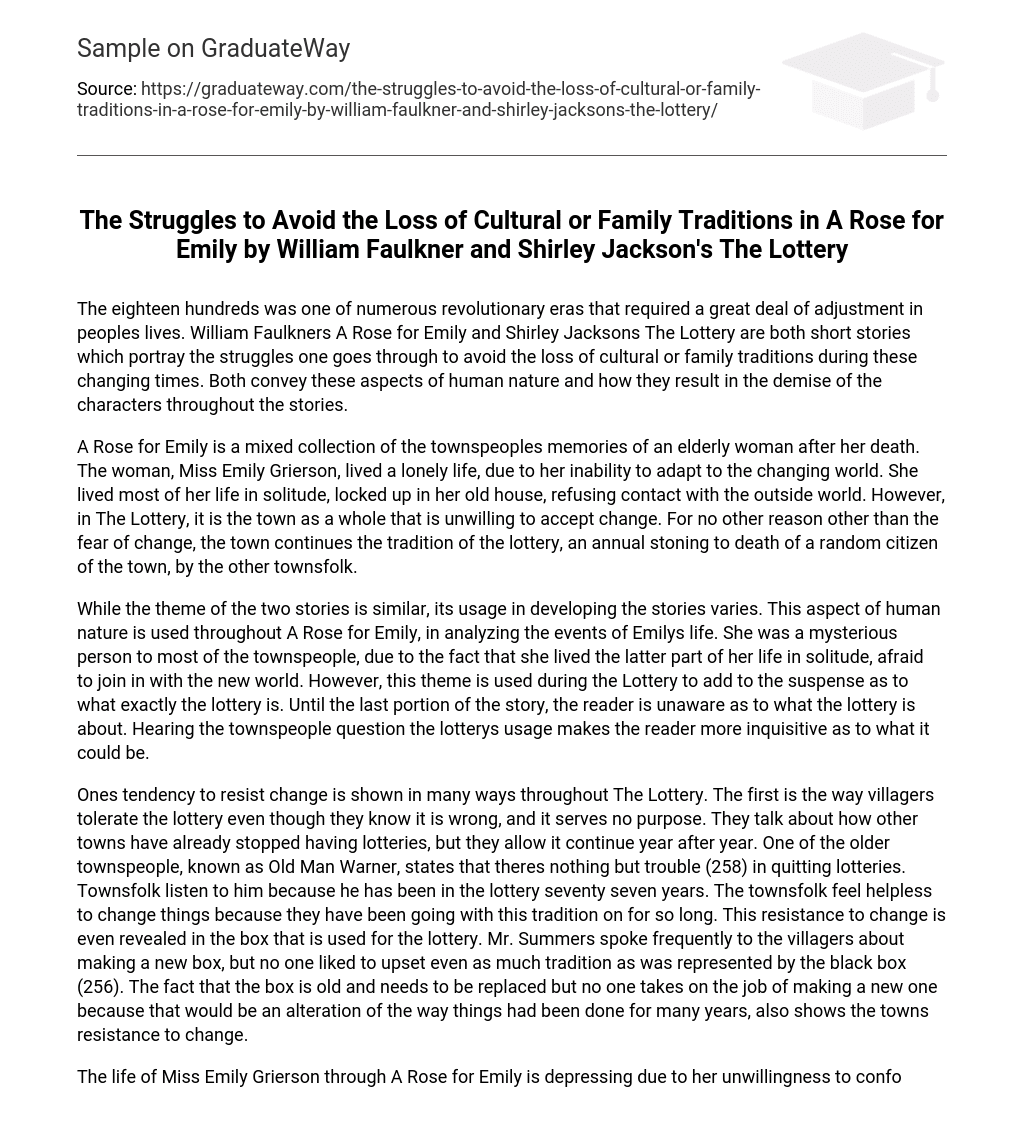The eighteen hundreds was one of numerous revolutionary eras that required a great deal of adjustment in peoples lives. William Faulkners A Rose for Emily and Shirley Jacksons The Lottery are both short stories which portray the struggles one goes through to avoid the loss of cultural or family traditions during these changing times. Both convey these aspects of human nature and how they result in the demise of the characters throughout the stories.
A Rose for Emily is a mixed collection of the townspeoples memories of an elderly woman after her death. The woman, Miss Emily Grierson, lived a lonely life, due to her inability to adapt to the changing world. She lived most of her life in solitude, locked up in her old house, refusing contact with the outside world. However, in The Lottery, it is the town as a whole that is unwilling to accept change. For no other reason other than the fear of change, the town continues the tradition of the lottery, an annual stoning to death of a random citizen of the town, by the other townsfolk.
While the theme of the two stories is similar, its usage in developing the stories varies. This aspect of human nature is used throughout A Rose for Emily, in analyzing the events of Emilys life. She was a mysterious person to most of the townspeople, due to the fact that she lived the latter part of her life in solitude, afraid to join in with the new world. However, this theme is used during the Lottery to add to the suspense as to what exactly the lottery is. Until the last portion of the story, the reader is unaware as to what the lottery is about. Hearing the townspeople question the lotterys usage makes the reader more inquisitive as to what it could be.
Ones tendency to resist change is shown in many ways throughout The Lottery. The first is the way villagers tolerate the lottery even though they know it is wrong, and it serves no purpose. They talk about how other towns have already stopped having lotteries, but they allow it continue year after year. One of the older townspeople, known as Old Man Warner, states that theres nothing but trouble (258) in quitting lotteries. Townsfolk listen to him because he has been in the lottery seventy seven years. The townsfolk feel helpless to change things because they have been going with this tradition on for so long. This resistance to change is even revealed in the box that is used for the lottery. Mr. Summers spoke frequently to the villagers about making a new box, but no one liked to upset even as much tradition as was represented by the black box (256). The fact that the box is old and needs to be replaced but no one takes on the job of making a new one because that would be an alteration of the way things had been done for many years, also shows the towns resistance to change.
The life of Miss Emily Grierson through A Rose for Emily is depressing due to her unwillingness to conform to the changing world around her. Although the Grierson name was one of the most respected in Jefferson, Emilys father believed that none of the young men were good enough for Emily (31). Mr. Grierson did not allow his daughter, even at 30, to make her own decisions. The name and attitudes that Mr. Grierson passes on to his daughter symbolically opposed the change that was going on around them. Even after his death, Miss Emily kept her fathers decaying body in the house. She clung tightly to the past telling everyone in the town that he was still alive.
Miss Emily was rarely seen by the public after the death. While she stayed locked in her house, it too fell victim to the changing world. The house was once a prestigious upper-class home, but soon was recognized as an eyesore among eyesores (28). Even the interior of the house was evidence of the lack of progression. It smelled of dust and disuse, even the leather furniture was cracked. When the town moved toward the future, the houses were replaced with cotton gins and auto garages until only Miss Emilys remained on the street. Even when the town offered free postal delivery, Miss Emily alone refused to let them fasten the metal numbers above her door and attach a mailbox to it (33). The house was a visible reminder of Miss Emilys refusal to submit herself to the changing ways.
A Rose for Emily and The Lottery are both dismal stories, with one common denominator, the theme of mans resistance to change. This can only conclude that a severe opposition to conform to or join into society will result in a downfall of the quality of life, or worse, a lonely death.





